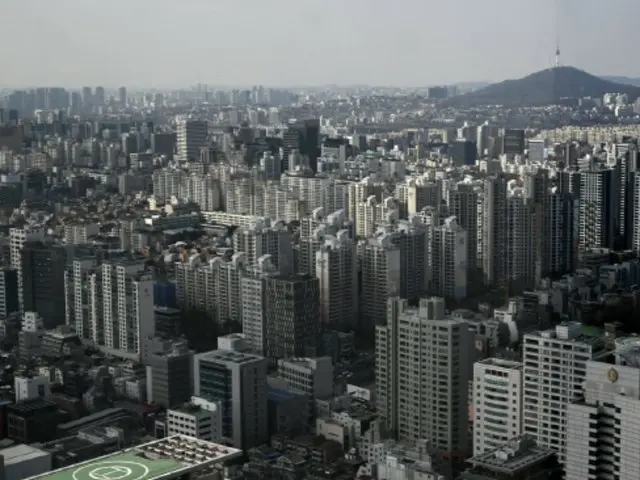In particular, in addition to the three districts of Gangnam and Yongsan, where the wealthy are concentrated, the rising wave is spreading to the major areas along the Han River that runs through the city center, known as the "Han River Belt." In Gyeonggi Province in the metropolitan area,
Apartment prices in Gwacheon have already recovered to an all-time high. According to an analysis of the weekly apartment sales price index released by the government agency Korea Real Estate Institute on the 15th, the prices of apartments in Gwacheon, Gangnam, Seocho, and Songdo in Seoul have risen to an all-time high.
Apartment prices are hitting new highs almost every week in seven districts, including the three districts of Gangnam, Mapo, Yongsan, Seongdong, and Yangcheon. Mapo-gu is the most recent of the seven districts to surpass its all-time high.
The buying and selling price index recorded 101.4 in the fourth week of May, surpassing the previous record high of 101.29 recorded in January 2022.
Yangcheon-gu also recorded its highest ever figure (January 2022) in the second week of May, ahead of Mapo-gu.
The average price of apartments in the three districts of Gangnam and Seongdong had already recovered to their highest levels last summer when the market was "booming," and has continued to rise ever since.
In the mountain district, prices also exceeded their all-time high in October last year. In these areas, the trend of concentrating investment in one good apartment rather than owning multiple properties is growing, and the number of people replacing their old apartments is on the rise.
The price hike is believed to be due to concentrated demand. In Seoul, even after the introduction of control measures such as expanding the area permitted for land transactions, housing prices have not been suppressed, and they are expected to remain stable in the future.
There is a high possibility that a series of properties will reach new record highs. In the three districts of Gangnam and Yongsan, prices have already risen sharply, making it difficult for the average person to purchase a property, and the "difference investment" scheme, which allows people to purchase a property with little personal capital, is also on the rise.
As a result of the restrictions on "gap investment," buyer demand is spreading to the surrounding six districts of the Han River Belt. According to data from the second week of this month (as of June 9), apartment prices are up 1.2% compared to their all-time highs.
The highest recovery rate was in Gwangjin-gu at 99.5%, followed by Gangdong-gu (99.2%), Yeongdeungpo-gu (98.5%), Dongjak-gu (98.1%), Jongno-gu (94.2%), and Dongdaemun-gu (92.7%).
Meanwhile, the recovery rate in the so-called “No Do Kang” area of Nowon, Dobong, and Gangbuk, which is said to have the lowest recovery rate, is in the mid-80s, with the recovery rate in Gangbuk-gu being 1.2%.
In Gyeonggi Province, apartment prices in Gwacheon-gu and Mapo-gu hit their all-time high in the fourth week of May. The Bundang area also saw a 9% increase in apartment prices.
This shows a high recovery rate of 8.8%. Park Won-gap, chief real estate expert at KB Kookmin Bank, said, "The national housing (84 square meters) type apartment in Banpo district, Seoul, is priced at 7 billion won.
"The polarization of the real estate market is becoming extremely serious, with the average price reaching 10,000,000 won (approximately 738 million yen)," he said. He added, "President Lee Jae-myung has pledged to raise the price of expensive apartments.
"Although the government has stated that it will not impose direct restrictions on the market, market stability is more important than deregulation or strengthening of regulations, so some sort of measures will likely be introduced."
In response to the overheating of housing prices, the government has emphasized its intention to use all available policy tools to tackle the problem, including expanding regulated areas.
However, as the selection of the ministers and vice ministers of the relevant ministries has not yet been completed, the market is paying close attention to when the government will announce its real estate measures.
Professor Kwon Dae-jung of the Department of Real Estate at Sogang University Graduate School said, "In the current situation, the government
"The government will have to consider designating areas subject to regulation or areas of overheated speculation as a way to curb demand," he predicted. Professor Kwon added, "Only expanding the areas subject to regulation will not lead to market stabilization.
"Housing prices continued to rise despite the introduction of many regulations during the Moon Jae-in administration because there was an abundance of liquidity in the market. Therefore, we must curb lending and liquidity and stabilize the real estate market," he said.
"We should block the inflow of funds into the country."
2025/06/16 05:39 KST
Copyrights(C) Herald wowkorea.jp 104

